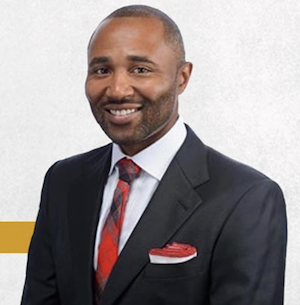Grambling State Tabs Hue Jackson as Head Football Coach
Hue Jackson becomes 14th head coach in Grambling's legendary football program
When Hue Jackson was announced on December 10, 2021 as the 14th head football coach in Grambling State University's history, it was yet another marker on what seems to be a return to prominence for historically black colleges and universities [HBCUs], especially HBCU college football.
Schools like Grambling, Florida A&M, and Morgan State once turned out busloads of talent that made history in the National Football League. Many went on to fame and fortune, winning Super Bowl championships and lasting stardom. At last count, 34 HBCU alumni had gained entry to the Pro Football Hall of Fame, including the likes of Jerry Rice, Walter Payton, and Michael Strahan.
But the pipeline began to dry up when the behemoths of college football began to mine the natural resources of the black athletic community. Even the segregated lily-white programs of traditional football powers of Alabama and Georgia (and basketball programs like Kentucky) and their ilk — along with their rabid alumni and community fan bases — had to make prejudice and take a back seat to the exigencies of competition and the desire to win.
The relevance in the big-time world of professional sports of HBCU athletic programs in major sports like football and basketball seemed to be headed in the direction of the old baseball Negro Leagues.
But a funny thing may be happening on the way to the dustbin. Elite former athletes have begun to head up men's — and women's — varsity teams at a growing number of HBCUs.
The trend is not entirely new. There were perhaps half a dozen or so former pro athletes at an HBCU a couple years ago. This past September, at least 13 of them were coaching football or men’s basketball at an HBCU, with seven hired since 2019. Among them: Deion Sanders at Jackson State; former Ohio State and NFL star Eddie George at Tennessee State; former Cleveland Cavalier, NBA champion and All-Star Mo Williams at Alabama State; 11-year NFL veteran Sean Gilbert at Livingstone College; and Bonzi Wells, the 11th overall NBA draft pick in 1998, at LeMoyne-Owen.
In the aftermath of George Floyd, the partisan assault upon voting rights, and signs of renewed vigilantism among a rabid portion of the population, an accelerated and more widespread return to the sanctuaries afforded by HBCUs is not altogether surprising. Black athletes in particular have often been leaders in the fight for social justice, possibly because doors were cracked open earlier in professional sports than in other parts of American society. And empowered black athletes and entertainers have often been earlier to confront and better able to contest discrimination and hostility in their industry and society.
It is too early to tell, but there could be a significant restructuring of internal black society if, given their greater independence and range of choices, black athletes and professionals in substantial numbers were to focus on building up institutions indigenous to our communities. This is one reason many of us cheered the decision by Nikole Hannah-Jones, after she was so badly treated by the University of North Carolina trustees, to decide not to accept tenure there but to join the Howard University faculty.
Another harbinger to keep your eye on is whether blue chip high school recruits follow the paths being forged by Neon Deion, Eddie George and the rest, and bypass the Alabamas and the Clemsons for the likes of a Jackson State or a Florida A&M or a Grambling.
It happened in prime time fashion last week when Travis Hunter, the number one recruit of the 2022 class and who had committed to Sanders' alma mater, Florida State, de-committed and chose to attend Jackson State. That marked the first time in history the consensus top high school pick selected an HBCU. While some naysayers, skeptics, and just plain haters unable to comprehend the young man's decision, suggesting that surely something illicit must have been involved [a hilarious role reversal on the surface], consider the note Hunter released in connection with his choice:
"Jerry Rice, Doug Williams, and of course the legend, JSU's own Walter Payton. Historically Black Colleges and Universities have a rich history in football," Hunter wrote. "I want to be a part of that history, and more, I want to be a part of that future. I am making this decision so I can light the way for others to follow, make it a little easier for the next player to recognize that HBCUs may be everything you want and more: an exciting college experience, a vital community, and a life-changing place to play football."
The ability of players to cash in on their name, image, and likeness [NIL] is going to have a major impact upon college football. If enough blue chip prospects follow Hunter's path, it could shake up more than college sports.

Mo Williams, member of the Cavaliers 2016 championship team, is men's basketball coach at Alabama State.
• • •• • •














